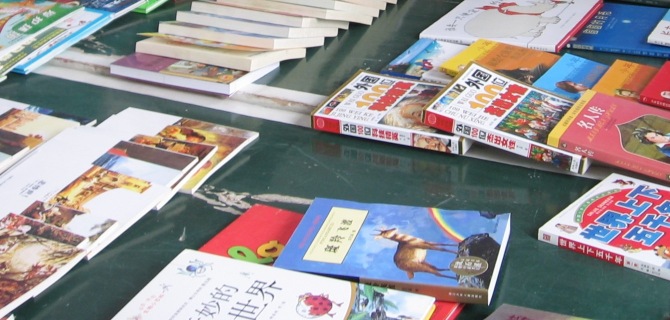Pleasure Reading
(We’re taking a break for a few weeks. In the meantime, we’ll be sharing a few posts from LEAPAsia’s WeChat—Chinese social media—page. Our purpose with these posts is to advocate for school children in China who we’ve come to see as slaves to the education system.)

Do the children in your home or classroom do enough pleasure reading?
Answering this question requires first answering a few more.
What is pleasure reading?
In China, 课外书[1] can include anything from a colorful picture book to a boring exercise book. Pleasure reading involves the first and definitely NOT the second. What pleasure is there in completing a boring set of exercises or memorizing a famous poem or saying? The picture shows a nice array of books that would fall in the category of pleasure reading.
What’s the purpose of pleasure reading?
Not to sound repetitious, but the point of pleasure reading is pleasure. Or to use different words, enjoyment and fun. Pleasure reading may lead to learning—vocabulary, facts and knowledge about the world—but the primary purpose is fun. And so we select books for pleasure reading based on the enjoyment they will give, not on how much children will learn. We select books because they tell an interesting story, put words together in a way that makes us laugh, or include eye-catching pictures.
What benefits does pleasure reading have?
In The Read-Aloud Handbook,[2] Jim Trelease has this to say about pleasure reading:
- “The more you read, the better you get at it; the better you get at it, the more you like it; and the more you like it the more you do it.”
- “The more you read, the more you know; and the more you know, the smarter you grow.”
His words are not just cute sayings (that may rhyme in English). He shares research that backs them up. Children who read for pleasure do better in school. Finland is described as a nation with a “staggering record of education success.”[3] On a reading test for 9-year-olds around the world, the Finnish children came out on top. Why? Because they are pleasure readers. What is it about pleasure reading that makes children both good readers and do better in school? For children who are read to (before they read on their own) and who read for pleasure:[4]
- vocabulary acquisition may be increased by as much as 40%.
- they may have as much as a 35 point advantage over their peers.
- their knowledge and skills may be a full semester ahead of their peers.
Pleasure reading helps to develop children’s background knowledge (which makes learning new information easier). Recent studies have also shown a connection between reading and social development. Reading fiction, in particular, helps to develop children’s ability to empathize with others.[5]
So now, back to our original question: Do the children in your home or classroom do enough pleasure reading? Your gut reaction might be to say that with all the homework they have,[6] they don’t have time to read for pleasure. Our gut reaction is to say that they don’t have time NOT to.
[1] This literally means “outside of class books” and is the closest concept to pleasure reading we’ve been able to find.
[2] Trelease, J. (2013). The Read-Aloud Handbook, Penguin Books, pp. 3-4.
[3] Hancock, L. (2011). “Why are Finland’s Schools Successful?,” Smithsonian Magazine, September 2011.
[4] Also from The Read-Aloud Handbook.
[5] Mar, R. A., Oatley, K., & Peterson, J. B. (2009). “Exploring the Link between Reading Fiction and Empathy: Ruling out Individual Differences and Examining Outcomes,” Communications, pp. 407-428.
[6] Even elementary school children in China may have 2-3 (or more) hours of homework each night and more on weekends.
Further exploration
- If you’d like to read the Chinese version of this post, you can find it here:
快乐阅读.
- If you or a friend would like to join our WeChat page, you can scan the QR code.
What’s your perspective?
- Of course, we welcome comments on the ideas in this post.
- We also welcome you to join us in advocating (before the throne) for school children in China.

Ha! Who’s been doing something other than thinking of mentoring?
Well done. Am I first to respond?
Marilyn
________________________________
LikeLike
Oh yes, you’re first to respond. 🙂
Writing about pleasure reading gave me pleasure…but so does writing about mentoring. 😉
LikeLike
I’ve never been more convinced of the necessity of reading for (pure) pleasure than I was in grad school, when it was most difficult. 🙂
LikeLike
Oh yes, take the pleasure away for a while, and then you’ll really see its value. 🙂
LikeLike
I remember coming home years ago to find a mother and her daughters engaged in pleasure reading. And those daughters definitely profited from that.
LikeLike
I remember you reading, every night for an hour, to two little girls a few years later. I don’t know about the one, but look at the difference it made for the other. 🙂
LikeLike